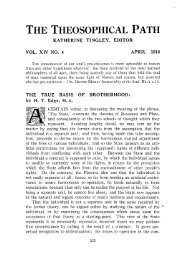vol. xxx, no. 4 april 1926 universal brotherhood - a fact in nature
vol. xxx, no. 4 april 1926 universal brotherhood - a fact in nature
vol. xxx, no. 4 april 1926 universal brotherhood - a fact in nature
Create successful ePaper yourself
Turn your PDF publications into a flip-book with our unique Google optimized e-Paper software.
SUPERFLUITY<br />
ment and false; though the <strong>in</strong>tuitive perception of the fitness of th<strong>in</strong>gs,<br />
which we call taste, may draw the l<strong>in</strong>e without a moment's hesitation,<br />
and with <strong>in</strong>fallible accuracy.<br />
If, however, we study <strong>nature</strong>, and learn to feel the fitness there<br />
is <strong>in</strong> the flowers that complete the beauty of the plant they adorn, we may<br />
get an idea of the relation of true ornament <strong>in</strong> art or architecture to the<br />
build<strong>in</strong>g or object it enriches.<br />
Delicate dist<strong>in</strong>ctions such as these are sometimes made more <strong>in</strong>-<br />
telligible by analogy. We may compare politeness to ornament. There<br />
are nations <strong>in</strong> which politeness is as natural as flowers are on blossom<strong>in</strong>g<br />
trees and plants; and undoubtedly there are others which resemble those<br />
plants that are cultivated or tolerated for the sake of their foliage or their<br />
timber; there are also valuable plants that bear their recommendations<br />
to our respect underground, such as potatoes and carrots. And are<br />
there <strong>no</strong>t people who possess sterl<strong>in</strong>g qualities of m<strong>in</strong>d and heart, but<br />
who are devoid of the ornamental feature of politeness, or whose polite-<br />
ness has so little sweetness and grace about it that it is only tolerable<br />
when ig<strong>no</strong>red?<br />
But man is <strong>no</strong>t a plant, and he must live up to a higher standard<br />
than that of a potato or a carrot. It is <strong>no</strong>t sufficient for him to have<br />
hidden virtues and bad manners. We should <strong>no</strong>t allow the boorish idea<br />
that politeness is superfluous and fictitious to be made an excuse for<br />
selfish laz<strong>in</strong>ess or for vulgar <strong>in</strong>solence (the ugly flowers of a low <strong>nature</strong>).<br />
Politeness is the blossom natural and proper to civilized humanity; it<br />
marks the completion of a certa<strong>in</strong> period of growth and e<strong>vol</strong>ution.<br />
Of course there is a vulgar affectation or mannerism that may be<br />
compared to the artificial flowers referred to, or to that k<strong>in</strong>d of ornament<br />
that is unnecessary and unsuitable; but then it is at once clear that<br />
such abom<strong>in</strong>ations are <strong>no</strong>t a natural blossom<strong>in</strong>g of civilization, but<br />
merely a parody upon <strong>nature</strong>.<br />
As the flower spr<strong>in</strong>gs spontaneously and joyously from the life<br />
of the plant, so does politeness come naturally and pleasantly from<br />
the heart of a man; and so does ornament blossom naturally without<br />
superfluity where it belongs, and never violates the 'fitness of th<strong>in</strong>gs.'<br />
"JUST as a candle can<strong>no</strong>t burn without a fire, man can<strong>no</strong>t live without<br />
a spiritual life. The spirit dwells <strong>in</strong> all men, but <strong>no</strong>t all men are aware of<br />
this." - Brahnzanio wisdom













